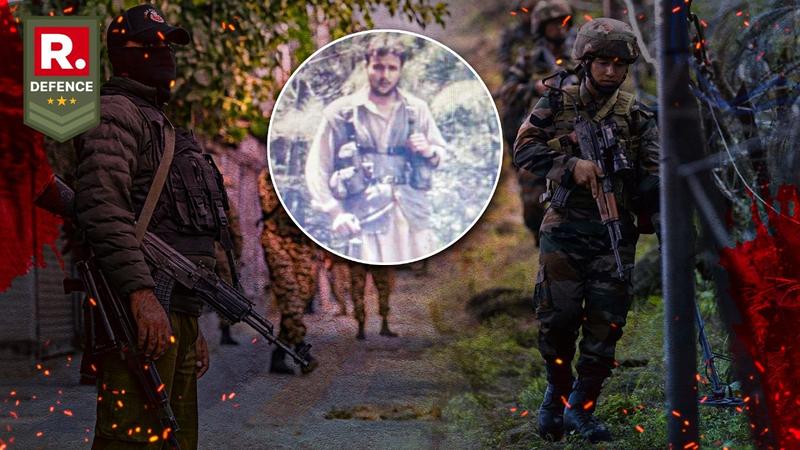Published 15:21 IST, November 5th 2024
How Brother of Kashmir’s First Suicide Bomber Hosted Top Lashkar Operative in Srinagar
In a disturbing echo of past insurgencies, Srinagar has once again witnessed a spike in terrorist activities tied to Pakistan-based groups.

Srinagar, India – In the spring of 2000, a young man named Afaq Ahmad Shah became Kashmir’s first suicide bomber when he detonated a vehicle packed with explosives outside the Indian Army’s XV Corps headquarters in Badami Bagh, killing two people and establishing a reign of terror in the region’s ongoing insurgency.
Now, over two decades later, his brother, Masood Shah, has brought the spotlight back to their family’s ties with terrorism. Masood, a contractor in Srinagar, reportedly provided shelter to a high-ranking Lashkar-e-Taiba (LeT) operative, leading to a recent police operation that uncovered significant terrorist activity in the heart of Srinagar.

The LeT operative, known by code names Usman and Khalid, used Masood’s home as a covert base to coordinate operations and plan high-profile attacks, including the recent killings of six workers and a doctor at the Z-Morh tunnel project. Police investigations suggest that Usman assessed and recruited young men interested in joining the jihad, facilitating the resurgence of extremist networks in Kashmir.
This incident highlights a disturbing trend among Kashmir’s jihadists, who are once again drawing attention through escalated activities. Despite India’s counter-insurgency efforts, militancy is far from quelled, with entrenched ties and familial legacies like the Shah brothers’ pointing to a deep-rooted ideological battle that shows little sign of abating.
Pakistan ’s Political Messages Versus Ground Realities
In recent months, Pakistan has publicly projected an image of seeking stability in the region. Pakistan’s Finance Minister Mohammad Ishaq Dar has hinted at the possibility of resuming trade with India. These overtures attempt to project Pakistan’s mindfulness towards the pressing need for peace, especially given the economic constraints it faces.
However, these diplomatic signals have been undercut by continuous infiltration attempts and escalating terrorist activity. Intelligence sources report that seasoned jihadists, many of whom fought alongside the Taliban in Afghanistan, have crossed the Line of Control (LoC) into the Pir Panjal range and other areas.

These terrorists have engaged in ambushes against Indian forces and targeted infrastructure projects intended to bolster Kashmir’s economy, including a recent assault on Indian civilians working on developmental initiatives. One such infiltration attempt near Jammu’s Akhnoor involved intense combat, resulting in the death of three terrorists and highlighting the level of sophistication and experience these fighters bring. Security analysts note that the presence of these seasoned fighters signals an attempt by Pakistan-based groups to intensify the conflict, hoping to exploit any emerging vulnerabilities in India’s security infrastructure.
Back-Channel Diplomacy and India’s Stance
Against the backdrop of these ongoing tensions, former Indian military officials met with a Pakistani delegation in Thailand to discuss possible solutions to ease hostilities. According to sources, the Pakistani side claimed that India’s support for separatists targeting the China-Pakistan Economic Corridor (CPEC) was behind their retaliatory stance in Kashmir. Pakistani officials proposed a back-channel negotiation process that would address their Kashmir concerns and also reduce terrorist activity.

India, however, remains firm in its stance that substantive dialogue cannot commence until terrorism is decisively curtailed. This position reflects New Delhi’s frustration with what it views as Pakistan’s ongoing ambivalence—condemning extremism publicly while allegedly allowing terrorist groups to operate from its territory. With the Kashmir Valley already seeing rising levels of violence, any suggestion of diplomatic dialogue is fraught with complexity. According to the South Asia Terrorism Portal, murders of civilians in Jammu and Kashmir have doubled in 2024, likely surpassing levels seen in the three years following the 2019 revocation of Kashmir’s special status.
India's Extensive Counter-Terrorism Operations
Since the abrogation of Article 370 in 2019, India has undertaken extensive counter-terrorism operations to stabilize the region. However, the rise in civilian deaths and terrorist activity this year is a troubling indicator of the entrenched challenges that persist. Security experts caution that while the increased violence is not yet at catastrophic levels, it signals potential dangers that could destabilize the region further. The continuing presence of skilled foreign fighters among local terrorists complicates efforts to root out extremism.

India’s efforts to counteract these trends now include significant investments in border surveillance and intelligence-gathering, especially in regions where terrorist infiltration is recurrent. The government has also bolstered its focus on infrastructure projects to provide economic opportunities in Kashmir, attempting to mitigate the socio-economic factors that often fuel local support for militancy.
As political tensions simmer between India and Pakistan, and back-channel efforts face significant hurdles, the situation in Kashmir remains delicate. Indian policymakers are carefully monitoring developments, as the security situation demands a delicate balance between strategic restraint and robust counter-terrorism measures to secure the region.
Updated 15:21 IST, November 5th 2024




